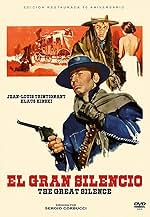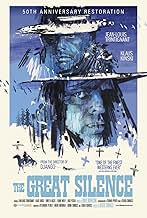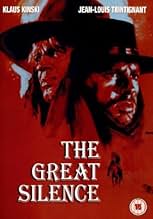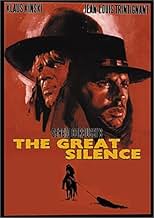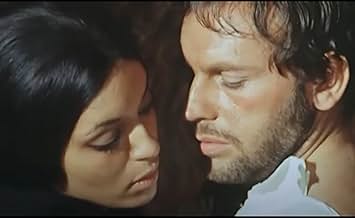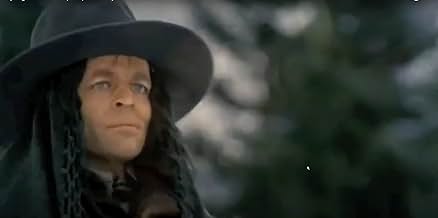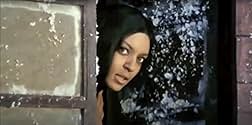Un tireur d'élite muet prend la défense d'une jeune veuve et d'un groupe de hors-la-loi contre un gang de tueurs à gages durant l'hiver 1898, et une lutte sinistre et tendue en découle.Un tireur d'élite muet prend la défense d'une jeune veuve et d'un groupe de hors-la-loi contre un gang de tueurs à gages durant l'hiver 1898, et une lutte sinistre et tendue en découle.Un tireur d'élite muet prend la défense d'une jeune veuve et d'un groupe de hors-la-loi contre un gang de tueurs à gages durant l'hiver 1898, et une lutte sinistre et tendue en découle.
- Prix
- 1 victoire au total
- Silenzio
- (as Jean Louis Trintignant)
- Pauline Middleton
- (as Vonetta Mc Gee)
- Governor of Utah
- (as Carlo D' Angelo)
- Outlaw
- (uncredited)
- Man in Saloon
- (uncredited)
- Poker Player
- (uncredited)
- Hunter
- (uncredited)
Avis en vedette
In the mountains of Utah, starving citizens of the town of Snow Hill are forced to steal to feed themselves, and in turn have to hide in the mountains with a price on their head. The corrupt banker and Justice of the Peace Pollicut (Luigi Pistilli), encourages bounty hunters to hunt them down, as he makes a percentage on every 'bandit' brought in. However, the persecuted folks have help in the form of Silence, who really, really hates bounty hunters – and with good reason. Silence will only fire upon someone if they draw first, and he also likes to shoot the thumbs off bounty hunters, as Pollicut knows too well.
Worst of all the bounty hunters is Loco (Klaus Kinski), who doesn't even care why people have a price on their heads, as long as he gets the money, and there's no 'dead or alive' where Loco is concerned. If they're dead, he doesn't have to feed them. Loco kills the husband of Pauline, who returned from exile to visit his wife, and she hires Silence to kill him. Loco knows that Silence is too fast for him, and will not be drawn into a gunfight yet.
There's also a new Sheriff in town that quickly twigs that things aren't quite right in Snow Hill. Burnett (Wolff, playing the only character approaching 'comic relief'), does not agree at all with Pollicut and Loco's tactics, even going so far as to arrest Loco and take him elsewhere for a trial.
That's enough plot! There's loads going on in this film, and plenty of it must have been quite daring for 1968. The interracial sex scene between Silence and Pauline for starters (and the music during this bit is outstanding, even for Morricone!), the bloody violence with headshots being a speciality, and the ending! The ending! Jesus! Buddha! Brian Blessed! The ending! Indy! The ending! I will not reveal it here, but it's certainly not something you encounter very often, in any genre. Jaw-dropping.
The acting is also faultless too, even if it is dubbed. Klaus Kinski is very restrained for the most part, but still comes across as a polite, malicious, sadistic murderer who is also smarter than everyone else. This might possibly be the best film I've seen him in. Luigi Pistilli isn't too far behind either. He's cowardly and scheming and likes to make others do his dirty work (mainly Mario Brega, who meets a gory end that stands out). Frank Wolff jumps between comedic and serious as the only male character in possession of a soul. His character follows the law to the letter, which may be a mistake in the hostile environment of Snow Hill. I'm not familiar with the actress that plays Pauline but she also stands out as a woman channelling her grief into one simple task – to kill Loco.
This one gets the highest recommendation for me!
-Plot: Bounty Hunters are collecting paychecks by snabbing up bandits in late 1880's Utah. A master gunfighter, "Silence", is out to collect dollars by killing those same bounty hunters who prey on the helpless marauders. "But who are the REAL bad guys?" is a question that carries throughout the entire film. As I mentioned before, there may be some moments in this film that seem dated and familiar, but let's focus on the un-familiar.."Silence" is mute, his throat slashed by bounty killers. Not only that, but he ALWAYS draws his gun in self-defense..Never draws first. And instead of arming himself with the traditional .38, "Silence" packs a Mauser C-96 (aka "Broomhandle") drawing fear into those who stand in his way. What else? Well, since Capt. Kirk brought forth headlines by kissing Lt. Uhura on STAR TREK, director Sergio Corbucci goes all out for a full interracial love scene (Unthinkable at the time) . What else?? This bad-boy takes place in the cold, desolated snow-bound hills, where a lot of violent stuff just seems to always happen..In fact, the blood-red violence appears much more graphic than ever in the white-frozen snow. And of course, there's the much-talked-about ending that is bound to slap EVERYONE in the face.
Here, Klaus Kinski proves that he was one of the most intense actors ever to appear in the 20th century. Just watch his movements/expressions during the last climactic scenes. Oh yeah, Ennio Morricone's incredible music is presented through-out. Want more? Please watch this film...If you can get a hold of it!
What we have here, is nothing less than the ultimate essence of the Spaghetti Western: irony, cruelty, tenderness, beauty, violence, larger than life characters... and chaos. the chaos is as present in the general mood as it is in Corbucci's wild and messy camera-work (from beautiful panoramas to crash zooms and close ups that accentuate the villains' ugliness).
The story is straight and simple but allows for great characters as the mute bounty hunter Silence (Trintignant, conveying impossible emotion with nothing but his haunting eyes) travels to a snowy town to bring down the killer of his client's husband and coincidentally fulfill a more personal vengeance. He is pitted against a range of pathetic and ugly villains, headed by a sleazy and psychotic Loco (Kinski, mesmerizing as the cruel but contained and playful killer).
All the while the nihilism and harshness of nature weigh over these characters as people freeze to death, a man drowns in a frozen lake and the survival of the fittest is demanded in a bloody fashion, leading to a devastating ending that seals this tight film together as a magnificently macabre opera of death. Unmissable.
The town of Snow Hill lives up to its name as Pauline Middleton, wonderfully performed by Vonetta McGee, seeks revenge for her husband's killing at the hands of Loco, a devious and scheming bounty hunter (just as wonderfully performed by Klaus Kimski), by hiring the man with no noise who goes by the name of Silent, and bears a close resemblance to a similar spaghetti western character you may have come across, played perfectly by the suave Jean-Louis Trintignant. The ending may leave you a little confounded as it takes a tangent you most likely won't be expecting or indeed be familiar with.
The circumstances leading up to this showdown should, in a more conventional western, be pretty clean-cut. But what's impressive, if almost a little circumstantial, is that Corbucci puts in little unconventional markers along the way: the high-drama scene where Silence gets his hand burnt by a goon as foreshadowing for the ominous bounty hunter massacre, and for those little moments when life seems so easily killed off, particularly at the start. Silence, like in a Leone film, does have something of a gimmick as a killer, as he shoots off the thumbs of his targets. But Corbucci's drama isn't keened on incredible suspense sequences in operatic form or gallows humor. Even a sex scene for Corbucci has a tenderness to it that feels the work of someone trying to break out of squarely B-movie extremities and trying for something more. If it isn't altogether successful it's attributable to flaws scattered around: random 'soft-lighting' in the last act that is very distracting, a couple of plot points not totally clear even by the end, and Kinski looking sometimes like a pretty boy as much as a sadistic bounty hunter, plus Corbucci's tendencies to favor close-ups for more formulaic means as opposed to drawing out deeper emotions through a more keen system.
But even with Corbucci not being a 'great' director, he has a keen eye for Utah (if it is Utah, which it probably isn't), and the vast vistas of snow and fields in a plain sight that contrasts the sort of void sucking the characters in with the hopeless center of bounty hunters without the strongest opponent. And Morricone, as if it was like breathing, fleshes out scenes so well with his beautiful score, only slightly below the magnificence of a Leone picture. You may feel by the end that it's not the prettiest western you've ever seen, but it has that possibility in its low-budget blood-stained manner to stay with you long after it's over.
Le saviez-vous
- AnecdotesAccording to Sergio Corbucci, Marcello Mastroianni gave him the idea of a mute gunfighter when the actor told him that he had always wanted to do a Western, but unfortunately didn't speak English. When Corbucci first met Jean-Louis Trintignant, he learned that he didn't speak English either. Because he had a fascination with characters with a crippling weakness, Corbucci decided that this was the moment to turn the taciturn Spaghetti Western hero into a mute.
- GaffesOn the map in the governor's office, the state of Nevada is identified as Utah.
- Citations
[English subtitled version]
Pauline Middleton: Once, my husband told me of this man. He avenges our wrongs. And the bounty killers sure do tremble when he appears. They call him "Silence." Because wherever he goes, the silence of death follows.
- Autres versionsTwo alternative endings were created for this film:
- A "happy" ending, in which Sheriff Burnett (having somehow survived being trapped under a frozen lake) rides into town and shoots Loco before he can kill Silence, allowing him to kill the remaining bounty killers. This ending was once believed to be shot for the North African and Japanese markets, but has since been revealed to have been created as an alternative solution for the producers, who wanted the film to have a "seasonal" (ie. Christmas) appeal.
- A lesser-known, "ambiguous" re-cut of the original ending with additional footage, in which Silence is wounded, but Loco gestures to his gang members to leave the saloon before they can kill anyone.
- ConnexionsFeatured in Western, Italian Style (1968)
Meilleurs choix
- How long is The Great Silence?Propulsé par Alexa
Détails
- Date de sortie
- Pays d’origine
- Langue
- Aussi connu sous le nom de
- The Great Silence
- Lieux de tournage
- Cortina d'Ampezzo, Belluno, Veneto, Italie(location scene)
- sociétés de production
- Consultez plus de crédits d'entreprise sur IMDbPro
Box-office
- Brut – États-Unis et Canada
- 53 074 $ US
- Fin de semaine d'ouverture – États-Unis et Canada
- 8 755 $ US
- 1 avr. 2018
- Brut – à l'échelle mondiale
- 60 500 $ US
- Durée1 heure 45 minutes
Contribuer à cette page


